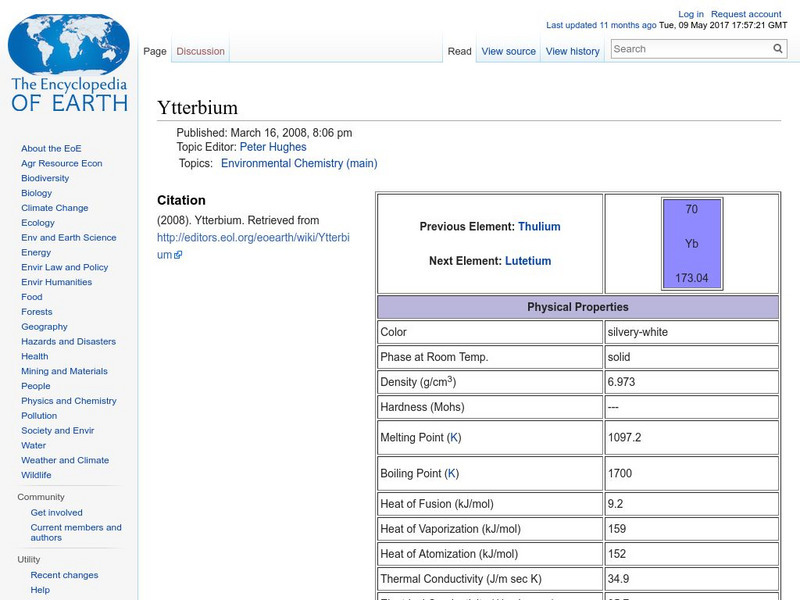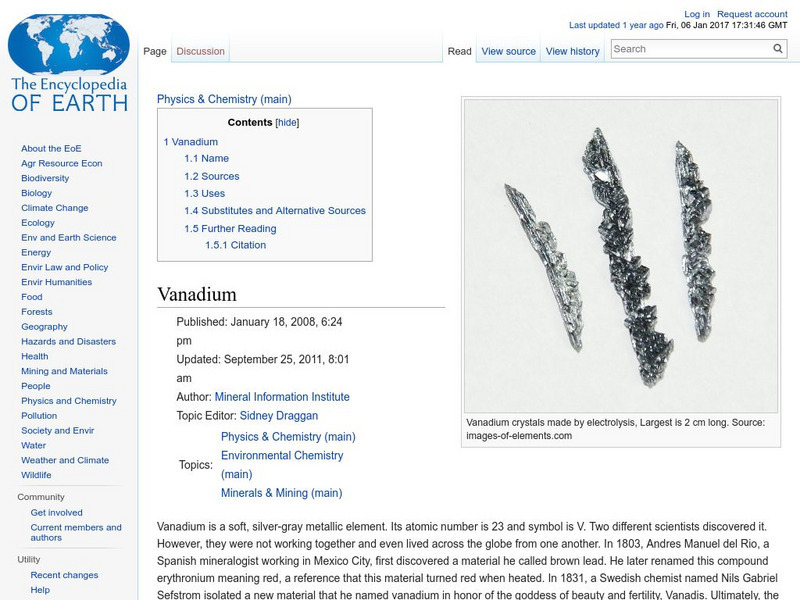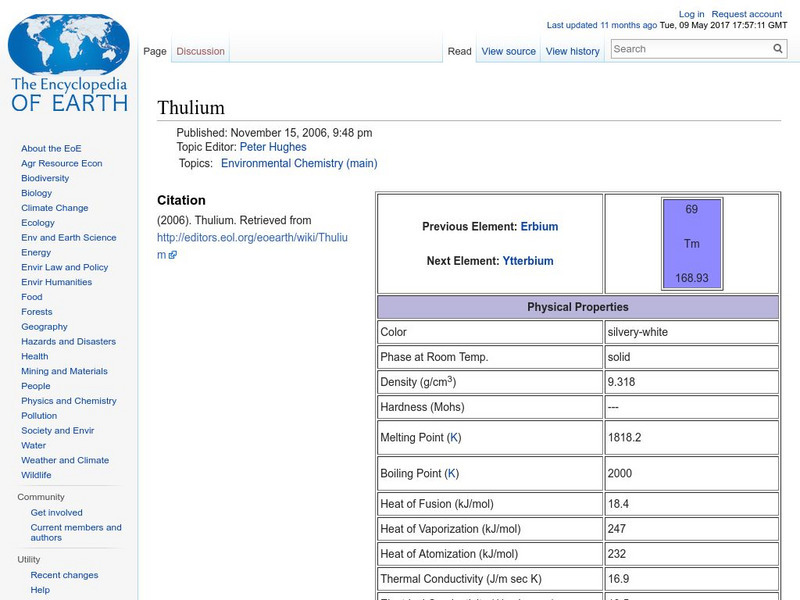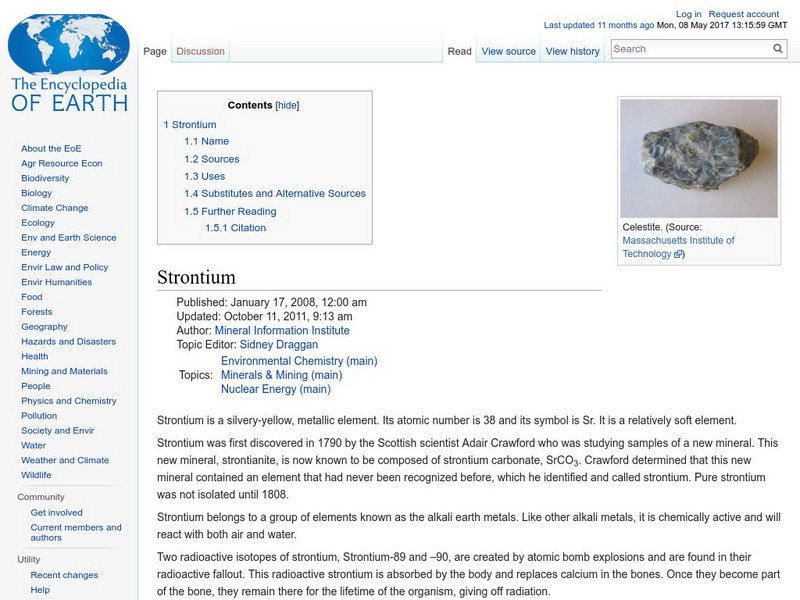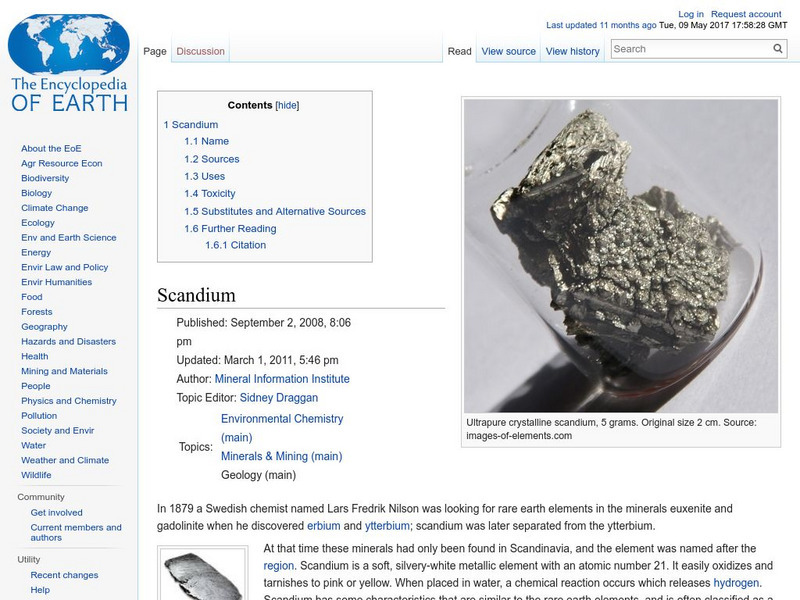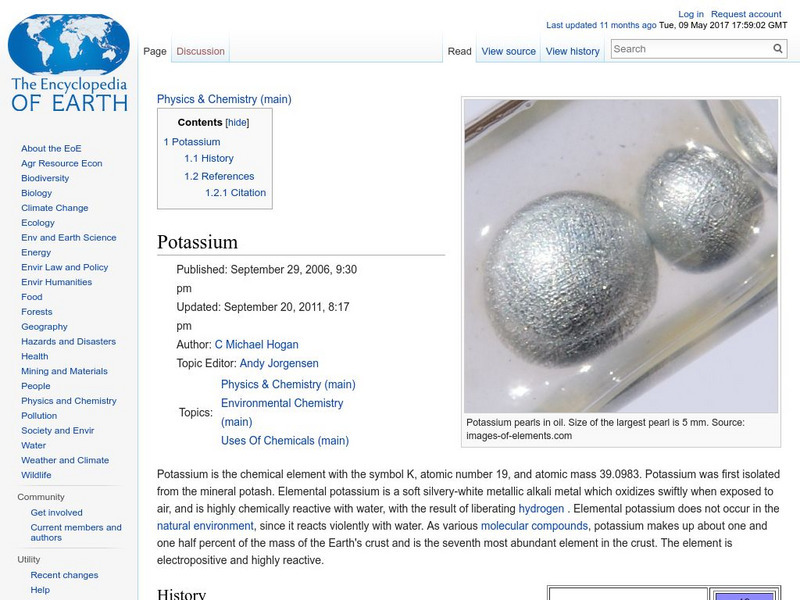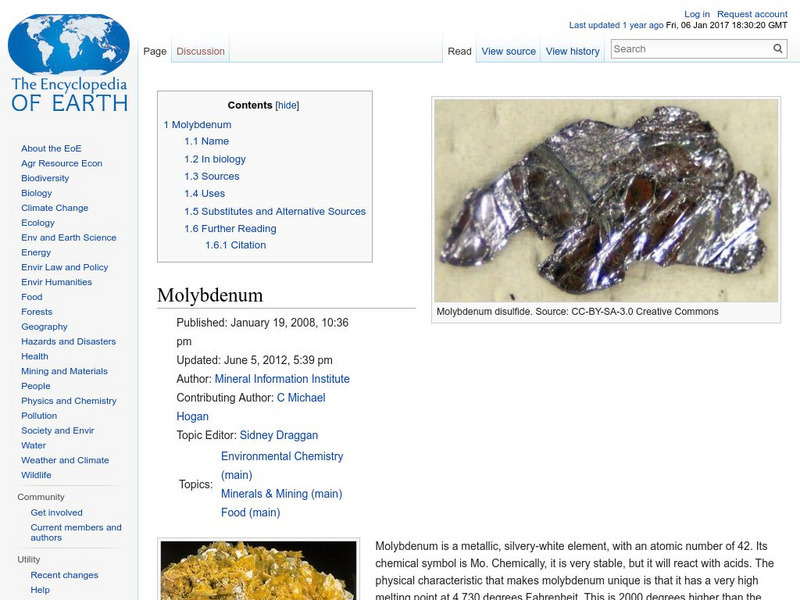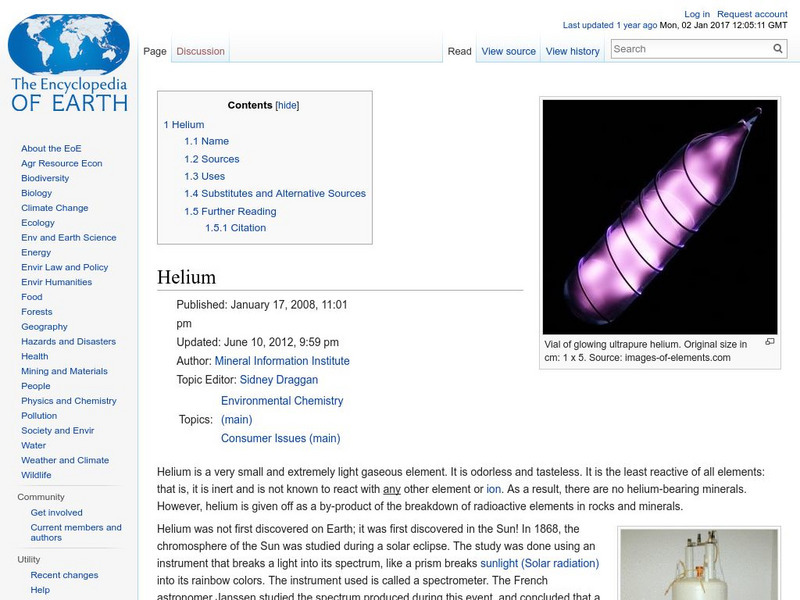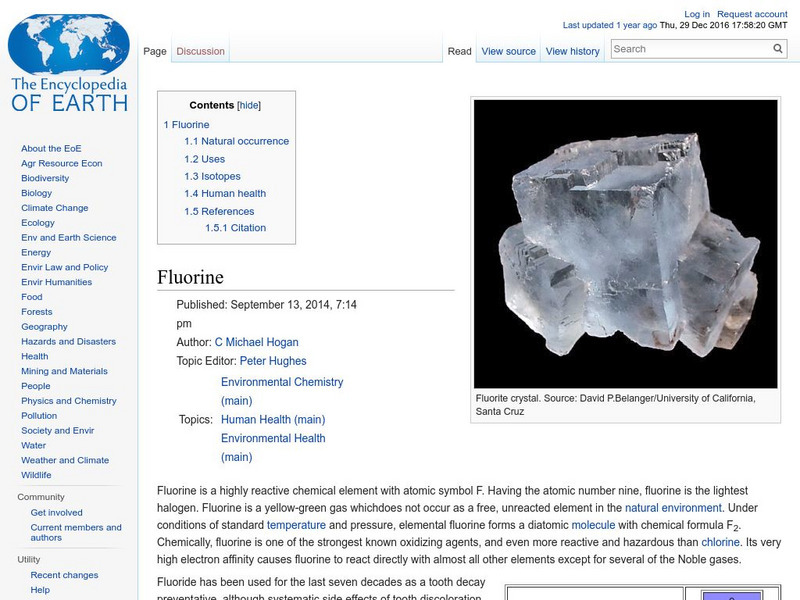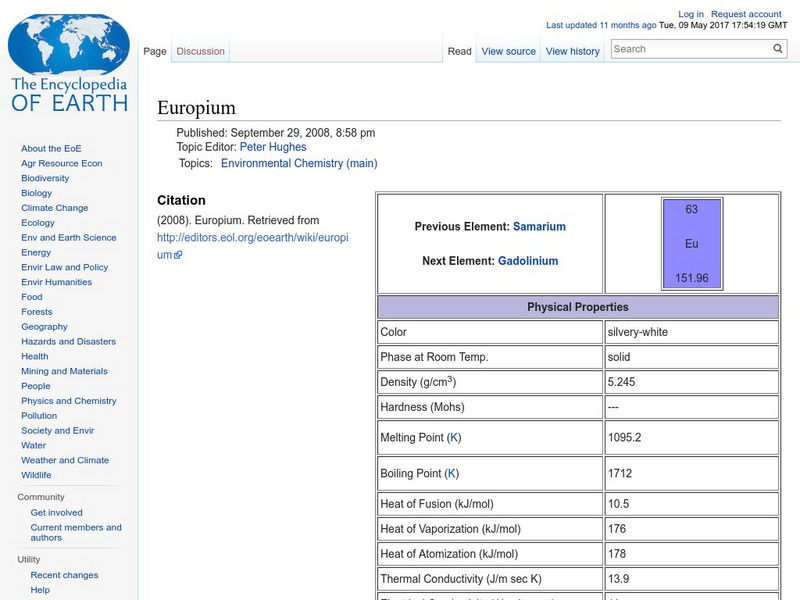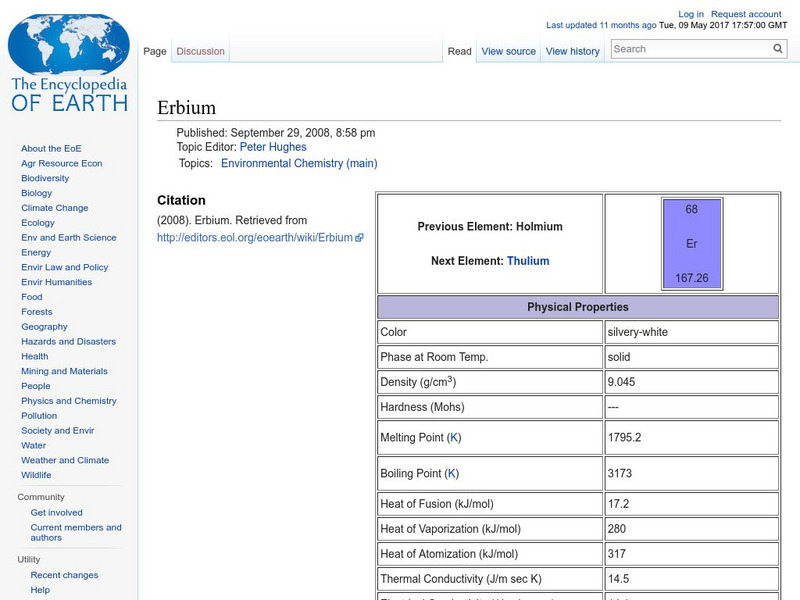Hi, what do you want to do?
Encyclopedia of Earth
Encyclopedia of Earth: Ytterbium
Information about the element, Ytterbium, atomic number 70. Covers physical properties, atomic properties, how abundant it is on the Earth, and details about health-related regulations.
Encyclopedia of Earth
Encyclopedia of Earth: Vanadium
Information about the element, Vanadium, atomic number 23. Covers its history, sources, physical and atomic properties, prevalence on the Earth, details about any health-related regulations, uses, and possible substitutes.
Encyclopedia of Earth
Encyclopedia of Earth: Titanium
Information about the element, Titanium, atomic number 22. Covers its initial discovery, physical properties, atomic properties, how abundant it is on the Earth, and details about health-related regulations. Also discusses sources, uses,...
Encyclopedia of Earth
Encyclopedia of Earth: Thulium
Information about the element, Thulium, atomic number 69. Covers physical properties, atomic properties, how abundant it is on the Earth, and details about health-related regulations.
Encyclopedia of Earth
Encyclopedia of Earth: Thorium
Information about the element, Thorium, atomic number 90. Covers physical properties, atomic properties, how abundant it is on the Earth, where it is found, and details about health-related regulations. Discusses thorium's potential use...
Encyclopedia of Earth
Encyclopedia of Earth: Strontium
Information about the element, Strontium, atomic number 38. Covers its history, sources, physical properties, atomic properties, how abundant it is on the Earth, details about permissible exposure, uses, and possible substitutes.
Encyclopedia of Earth
Encyclopedia of Earth: Silver
Information about the element, Silver, atomic number 47. Covers physical properties, atomic properties, how abundant it is on the Earth, and details about health-related regulations and effects from exposure to it. Also discusses...
Encyclopedia of Earth
Encyclopedia of Earth: Scandium
Information about the element, Scandium, atomic number 21. Covers physical properties, atomic properties, how abundant it is on the Earth and where it is found, and details about any impact on human health.
Encyclopedia of Earth
Encyclopedia of Earth: Rubidium
Information about the element, Rubidium, atomic number 37. Covers physical properties, atomic properties, how abundant it is on the Earth, and details about health-related regulations.
Encyclopedia of Earth
Encyclopedia of Earth: Potassium
Basic information about the element Potassium, atomic number 19. Covers its history, physical and atomic properties, and how abundant it is on the Earth.
Encyclopedia of Earth
Encyclopedia of Earth: Platinum
Information about the element, Platinum, atomic number 78. Covers its physical and atomic properties, how abundant it is on the Earth, sources, uses, potential substitutes, and permissible exposure limits.
Encyclopedia of Earth
Encyclopedia of Earth: Nitrogen
Information about the element, Nitrogen, atomic number 14. Covers common chemical transformations, its physical properties, atomic properties, how abundant it is on the Earth, and details about health-related regulations. Also discusses...
Encyclopedia of Earth
Encyclopedia of Earth: Molybdenum
Information about the metallic element, Molybdenum, atomic number 42. It is unique in having an extremely high melting point. Covers its discovery, its biological importance, its physical and atomic properties, how abundant it is on the...
Encyclopedia of Earth
Encyclopedia of Earth: Manganese
Information about the element, Manganese, atomic number 25. Covers physical properties, atomic properties, how abundant it is on the Earth, details about health-related regulations, and its importance to human health. Also discusses...
Encyclopedia of Earth
Encyclopedia of Earth: Lutetium
Information about the element, Lutetium, atomic number 71. Covers physical properties, atomic properties, how abundant it is on the Earth, and details about health-related regulations.
Encyclopedia of Earth
Encyclopedia of Earth: Lithium
Information about the metallic element, Lithium, atomic number 3. Covers its discovery, its physical and atomic properties, how abundant it is on the Earth, sources, uses, potential substitutes, and permissible exposure limits.
Encyclopedia of Earth
Encyclopedia of Earth: Iron
Information about the element, Iron, atomic number 26. Covers physical properties, atomic properties, how abundant it is on the Earth, and details about health-related regulations, and its importance to plant and to animal health. Also...
Encyclopedia of Earth
Encyclopedia of Earth: Iodine
Information about the element, Iodine, atomic number 53. Covers physical and atomic properties, how abundant it is on the Earth, permissible exposure limits, sources, uses, and potential substitutes.
Encyclopedia of Earth
Encyclopedia of Earth: Helium
Information about the element, Helium, atomic number 2. Covers its discovery, physical and atomic properties, how abundant it is on the Earth, its uses, possible substitutes, and permissible exposure limits.
Encyclopedia of Earth
Encyclopedia of Earth: Gold
Information about the element, Gold, atomic number 79. Covers its unique physical properties, its atomic properties, how abundant it is on the Earth, sources, uses, and potential substitutes.
Encyclopedia of Earth
Encyclopedia of Earth: Fluorine
Information about the element, Fluorine, atomic number 9. Covers physical and atomic properties, how abundant it is on the Earth, and permissible exposure limits. Also discusses uses, isotopes, and health concerns.
Encyclopedia of Earth
Encyclopedia of Earth: Europium
Information about the element, Europium, atomic number 63. Covers physical properties, atomic properties, how abundant it is on the Earth, and details about health-related regulations.
Encyclopedia of Earth
Encyclopedia of Earth: Erbium
Information about the element, Erbium, atomic number 68. Covers physical properties, atomic properties, how abundant it is on the Earth, and details about health-related regulations.
Encyclopedia of Earth
Encyclopedia of Earth: Curium
Information about the element, Curium, atomic number 96. Covers physical properties, atomic properties, how abundant it is on the Earth, and details about health-related regulations.





